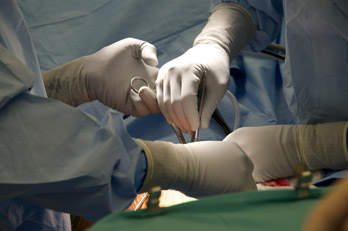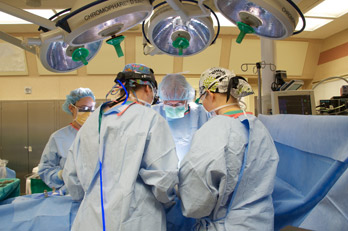Breast Surgery
Residents learn procedures related to the surgical treatment of breast conditions, such as cyst aspiration, FNA, and percutaneous core needle biopsy.
Burns
As the only Burn Treatment Center in Iowa, this service provides exposure to a diverse set of patients of all ages and with all mechanisms of burn and soft tissue injury. In addition to treating patients with chemical, electrical, and thermal energy burns, residents will care for individuals with severe frostbite injuries and necrotizing soft tissue infections. Residents learn management of the acutely injured burn patient, wound care, and skin harvesting and grafting.

Cardiothoracic Surgery
Residents rotating with this service are involved with cardiac surgeries on pediatric and adult patients. Working with thoracic surgeons, they receive training in procedures including esophagectomies, resections of mediastinal masses, and thoracoscopic and open lung resections. They will also gain experience in heart and lung transplantation.
Cedar Rapids
Second year residents have the opportunity to rotate at the Cedar Rapids based Mercy General Surgery Clinic, comprised of University of Iowa Department of Surgery faculty members. While on this rotation, residents are involved in acute care, general, and trauma cases that include appendectomies, breast biopsies, colon and rectal surgery, gallbladder surgery, general laparoscopic surgery, and vascular access surgery.
Chief Rotation
This month is an opportunity for senior residents to gain experience in surgical cases of their interest as well as to work with endoscopists to further their upper and lower endoscopy skills. Residents in their "chief month" meet regularly with the department chair to review the weekly operative cases and they also lend assistance by covering cases for the surgical teams as needed.

Emergency General Surgery
This is the general surgery consult service for the University. Residents rotating on this service develop the skills to efficiently and thoroughly evaluate patients and treat for "bread and butter" issues including appendicitis, cholecystitis, bowel obstruction, hernia, and perforated viscera.
GI Surgery
This service encompasses the breadth of benign and malignant diseases of the small bowel, colon, rectum and anus. Residents rotating on this service learn lower endoscopy and are trained in open, laparoscopic, and robotic approaches to a variety of colorectal conditions. Additionally, this service encompasses the University of Iowa Obesity Surgery, a bariatric Center of Excellence, where residents gain significant experience in gastric bypass surgery, laparoscopic experience performing ventral and inguinal herniorrhaphy, paraesophageal hernia repair and Nissen fundoplication, cholecystectomies via a minimally-invasive approach.
Mason City
Third year residents have the opportunity to rotate at a private practice hospital, Mercy Medical Center in Mason City, Iowa. The majority of the resident's time is spent operating and cases range from outpatient hernia and laparoscopic cholecystectomies to mastectomies, colon resections, and any general surgery emergencies that present. Residents also take trauma call and are responsible for evaluating and stabilizing patients. Housing is provided.
Night Float
This team is a combination of Trauma and Emergency General Surgery services. Residents are responsible not only for evaluation and treatment of trauma patients and general surgery consults, but they also provide cross-coverage for surgical patients admitted during the day.
Pediatric Surgery
Residents rotating on this service are exposed to elective and emergent surgeries for all ages, from premature neonates to teenagers. The team also manages pediatric trauma patients. It works closely with the Pediatric Gastroenterology team as well as the NICU and PICU. Across all pediatric ages, residents gain varied experience operating in the neck, thorax, and abdomen through both open and laparoscopic approaches. Common neonatal procedures performed include closure of gastroschisis and omphalocele, treatment of tracheoesophageal fistulas, repair of congenital diaphragmatic hernias, and management of necrotizing enterocolitis.
Plastic Surgery
Residents learn a diverse set of procedures such as scar revision, liposuction, post-mastectomy breast reconstruction, component separation for hernia repair, and microvascular free flaps.
Surgical Intensive Care Unit
Rotating in the SICU provides an unparalleled opportunity to care for a diverse set of critically ill patients. Working with critical care specialists trained in surgery, anesthesia, medicine, and pharmacy, residents are part of a multidisciplinary team managing patients with complex needs. Residents learn ventilator management, vascular access, tracheostomy and PEG placement, and neurologic monitoring.
Surgical Oncology
Residents learn to diagnose, stage, and determine optimal treatment for a variety of malignancies including melanoma, sarcomas, gastric cancer, pancreatic cancer, and neuroendocrine tumors. Multidisciplinary tumor board conferences facilitate integration of information from a number of specialties to determine the optimal care plan for patients. Additionally, this team encompasses surgical treatment of thyroid and parathyroid conditions.
Transplant
This service specializes in liver, pancreas, and kidney transplants, as well as in hepatobiliary procedures. Residents are trained in the harvesting of organs for transplant, including laparoscopic donor nephrectomies, as well as in the transplantation of these organs. Hepatobiliary procedures performed include those for benign and malignant conditions. Perioperative management of the transplant and hepatobiliary patient is emphasized. Residents will work closely with members of the Transplant Hepatology and Transplant Nephrology teams.
Trauma
UIHC the only Level 1 Trauma Center in the state, caring for seriously injured patients. Residents on the Trauma service learn to rapidly assess and treat these patients, as well as to manage their overall cares once stabilized. The trauma team works closely with other surgical sub-specialties to coordinate and meet patients' treatment needs. All general surgery residents will be ATLS certified. Common procedures performed on this service include: FAST exam, chest tube placement, central line placement, tracheostomies, and trauma laparotomies.
Vascular Surgery
Residents rotating on this service will receive training in procedures including: open and endovascular repair of aneurysms, carotid endarterectomy, creation of arterial venous fistulas for hemodialysis, and lower extremity vascular bypass. The mid-level resident is in charge of the outpatient endovascular procedures performed in the cardiac cath lab which include primarily diagnostic and therapeutic angio/venograms as well as vascular access.

Veterans Affairs Hospital - General Surgery
This is the general surgery consult service for the Iowa City Veterans Affairs hospital, located across the street from the University of Iowa. Similar to the University service, residents develop the skills to efficiently and thoroughly evaluate patients and treat for "bread and butter" issues including appendicitis, cholecystitis, bowel obstruction, hernia, and perforated viscera. Additionally, renal transplants and thoracic procedures are performed at this VA.
Veterans Affairs Hospital - Vascular Surgery
Residents rotating on this service will receive training in procedures including: open and endovascular repair of aneurysms, carotid endarterectomy, creation of arterial venous fistulas for hemodialysis, and lower extremity vascular bypass.